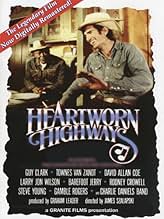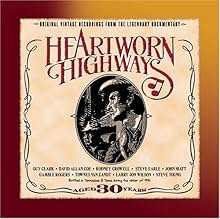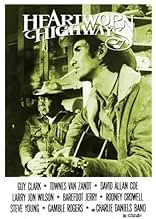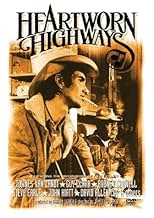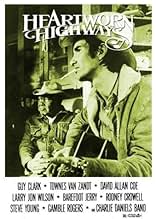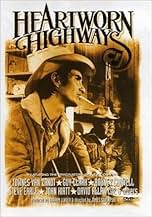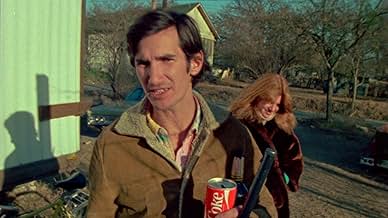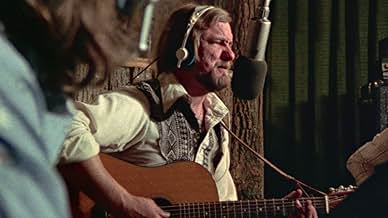The best music and the best whiskey come from the same part of the country.The best music and the best whiskey come from the same part of the country.The best music and the best whiskey come from the same part of the country.
- Director
- Writer
- All cast & crew
- Production, box office & more at IMDbPro
Featured reviews
This film is about the "outlaw" country music movement of the 70s, when artists rejected the glossy, strings filled Nashville sound and made poignant, gritty music. Guy Clark, David Allen Coe, Charlie Daniels and more are featured. Townes Van Zandt really steals the show, though. Out in his ratty trailer he shown drinking whiskey and shooting bb guns. He sits down in the kitchen and plays some songs for his girlfriend and his elderly black neighbor (whose interactions with Townes are amazing) and plays some of the most amazing music you'll ever hear. There are also some great scenes of a little local ensemble playing in a bar. This is a must-see film for fans of Real Country Music. The pop pablum was crap then and its crap now. Real country will live on.
In 1975, James Szalapski decided to make a film about country music. Instead of going to the big names, he was put in touch, via a mutual acquaintance, with bassist Skinny Dennis, a notorious hell-raiser who left little musical legacy when he died a short while later, but who was much loved by his friends, who included many of the most talented up-and-coming singer songwriters of that time. Among them was Guy Clark, whose house was a meeting place for geniuses such as Townes van Zandt, Steve Young, Rodney Crowell and even Steve Earle, then completely unknown but starting to make his musical career. It's this network, centred on Clark, that occupies the heart of this film. Szalapski films them going about their normal lives: none of them are rich, none of them are famous, and crucially none of them expect to become either of those things by appearing in this film. But their wholly authentic love for their music, and their wholly exceptional abilities, enliven one of the most genuinely intimate (and musically sublime) documentaries you are likely to see. Szapalski also films a selection of other rootsy artists, but it's with Clark and his friends, all utterly obscure at that time, where the film's heart beats loudest. The new DVD contains extra performances cut from the original; many are good in isolation, but it's to Sazpalski's credit that the material he chose for inclusion suits the finished film better than that he omitted. A fine film, and (with Townes now dead) a poignant one as well.
Shot in 1976, "Heartworn Highways" is a laid-back documentary look at several fringe talents in Country and Western music, who represent something of an alternative to the mainstream of that genre. Pic's strengths lie in its superb stereo recording of the music and its imparting the folksy charm of the performers, but absence of narration or traditional interview material leaves the viewer with little historical background and no way to "place" the artists within the current musical scene.
Director-cameraman James Szalapski does not attempt to dramatize or inflate the importance of his subject, preferring a matter-of-fact approach. The eccentricities of singers Townes Van Zandt and ex-con turned "Rhinestone Cowboy" David Allan Coe come through without any coaxing and yield some light comic elements to interrupt the standard performance-film format.
Besides slice-of-life peeks at rustic types in Nashille's Wigwam Tavern, pic's highlights include a very entertaining and elaborate talk-preamble to a song by Gamble Rogers, several moving folk-like ballads by Guy Clark and a strange performance at Tennessee State Prison by Coe. Music takes on a rock orientation in concert footage of the Charlie Daniels Band.
Both sound and 35mm blowup quality are excellent.
My review was written in April 1981 after a Times Square screening.
Director-cameraman James Szalapski does not attempt to dramatize or inflate the importance of his subject, preferring a matter-of-fact approach. The eccentricities of singers Townes Van Zandt and ex-con turned "Rhinestone Cowboy" David Allan Coe come through without any coaxing and yield some light comic elements to interrupt the standard performance-film format.
Besides slice-of-life peeks at rustic types in Nashille's Wigwam Tavern, pic's highlights include a very entertaining and elaborate talk-preamble to a song by Gamble Rogers, several moving folk-like ballads by Guy Clark and a strange performance at Tennessee State Prison by Coe. Music takes on a rock orientation in concert footage of the Charlie Daniels Band.
Both sound and 35mm blowup quality are excellent.
My review was written in April 1981 after a Times Square screening.
GREAT Movie. Whiskey, guns and real country music. This documentary really capture the spirit of these excellent musicians, the outlaws of the southern music industry, and is a must see for any fan of country music. I have been listening to the music of these guys for years, but I wasn't aware of this movie until yesterday - I watched it and for me it sums up all that is fascinating about these artists and the music they are playing.
If you are not a big fan of country music it is still a great documentary about a bunch of crazy, drinking, smoking, legendary musicians and their way of life in the 70's. Also, I believe it will give you new insight to what this music is all about and it leaves you wanting to find out more about these guys and their country music.
If you are not a big fan of country music it is still a great documentary about a bunch of crazy, drinking, smoking, legendary musicians and their way of life in the 70's. Also, I believe it will give you new insight to what this music is all about and it leaves you wanting to find out more about these guys and their country music.
I can't say I'm a fan of country music, but I was really interested in knowing more about this scene. I wasn't familiar with most musicians, I only knew Townes Van Zandt who really, for me, was the best part of the documentary. The other musicians are quite talented, but their lyrics are all about whiskey, beer and wine and having a good time in Texas, which compared to Van Zandt's lyrics, they are just too weak, too shallow. It was funny to see Townes acting all silly and then seeing him play "Waitin' around to die" with such passion and making his neighbor cry. It was disappointing that the documentary didn't show any more footage of him or something deeper about this whole music scene and its roots or context. Instead, it even shows a sequence like a Jack Daniel's commercial and a long pre-show preparation which are almost equal to the time given to Townes, so it kind of feels like an insult. Nearly by the end, David Allan Coe makes the documentary more interesting and emotional, but overall, I think it's almost like a documentary you could just listen to instead of watch.
Did you know
- ConnectionsFeatured in Be Here to Love Me (2004)
- How long is Heartworn Highways?Powered by Alexa
Details
Contribute to this page
Suggest an edit or add missing content



